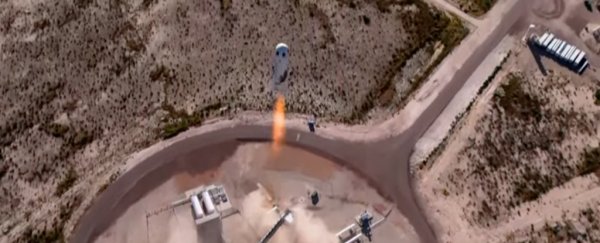Star Trek actor William Shatner finally became a real space traveler on Blue Origin's second crewed mission Wednesday, calling it the most profound experience of his life.
"It was unbelievable," said the 90-year-old Canadian, known to the sci-fi show's legion of "Trekkies" as the daring Captain James T. Kirk, a role he first played more than half a century ago.
He was joined on the 11-minute journey beyond Earth's atmosphere and back again by three others: Blue Origin executive Audrey Powers, Planet Labs co-founder Chris Boshuizen, and Glen de Vries of Medidata Solutions.
A New Shepard rocket took off from the company's West Texas base around 9:49 am (1449 GMT) after experiencing two brief delays, eventually soaring to 66 miles (106 kilometers) above sea level.
 William Shatner at the New Shepard rocket landing pad. (Patrick T. Fallon/AFP)
William Shatner at the New Shepard rocket landing pad. (Patrick T. Fallon/AFP)
Founder Jeff Bezos was on hand to greet the crew members as they climbed out of the capsule, which parachute-landed in desert, and were showered with applause and champagne.
Like the almost 600 astronauts who have gone before him, Shatner marveled at the experience of weightlessness and the stunning view of our world from space.
"What you have given me is the most profound experience I can imagine. I'm so filled with emotion about what just happened," he said, moved to tears.
"What you're looking down on is Mother Earth, and it needs protecting," he later told reporters.
The mission was a replay of the company's maiden human flight in July, which included Bezos and was seen as a breakthrough moment for the nascent space tourism sector.
This time around, all attention was focused on Shatner, who became the oldest-ever astronaut, despite an appearance suggesting a man decades younger.
The intergalactic voyages of the USS Enterprise, commanded by Shatner's character Kirk, helped turn American attention to the stars as the US space program was starting out.
"Captain Kirk… represents 'the final frontier' perhaps more than anyone else for a couple different generations of people, in the US and worldwide," screenwriter and Trek historian Marc Cushman told AFP.
Shatner, also known for his role as lawyer Denny Crane in Boston Legal, among many others, has spoken in the past about an at-times difficult relationship with Star Trek and its fan culture.
But in recent years, the actor has leaned into the fame brought about by his most famous role.
"I'm overwhelmed by the response," said Shatner, when asked by AFP about the outpouring of support he has received from fans and the wider space community since the mission was announced.
Space tourism heating up
For Blue Origin, meanwhile, a second mission in less than three months represents another step forward as it tries to establish itself as space tourism's leading player.
Boshuizen and Vries brought the company's total number of paying customers to three, after Dutch teen Oliver Daemen who was on board the first flight.
Competition in the sector is heating up.
Virgin Galactic, which offers a similar experience of a few minutes' weightlessness and a view of the Earth's curvature from the cosmos, launched its founder Richard Branson in July, a few days before Bezos.
And in September, SpaceX sent four private citizens on a three-day trip whizzing around the planet – an altogether more ambitious, but also likely far more expensive endeavor.
For many space enthusiasts, Shatner's voyage was a fitting coda for a pop culture phenomenon that inspired generations of astronauts, scientists, and engineers.
The show has had a long-running association with NASA, whose scientists were sent early scripts to vet their accuracy, according to Cushman.
"Those scientists, as well as nearly everyone at those space agencies, were avid Star Trek watchers, and they well understood that the popularity of the series helped spark growing interest and funding for the space program," he said.
Another mega-fan: Bezos himself.
The Amazon founder shared an Instagram post of Star Trek artwork he made when he was nine years old.
Bezos has said Amazon's Alexa voice assistant was inspired by the conversational computer on the Enterprise, and he even made a cameo as an alien in the 2016 film Star Trek Beyond, sporting an egg-shaped head.
